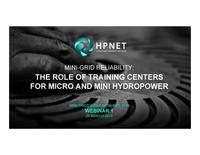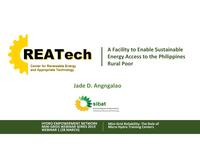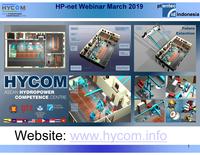Difference between revisions of "Mini-Grid Webinar Series 2019"
***** (***** | *****) m |
***** (***** | *****) m Tag: 2017 source edit |
||
| (10 intermediate revisions by the same user not shown) | |||
| Line 17: | Line 17: | ||
''[1] In this context, micro hydropower refers to <100kW, and mini hydropower refers to 100 - 1000 kW (or 1MW).'' | ''[1] In this context, micro hydropower refers to <100kW, and mini hydropower refers to 100 - 1000 kW (or 1MW).'' | ||
| − | + | </div> | |
{{template:Tabs-4 | {{template:Tabs-4 | ||
|Mini-Grid_Webinar_Series_2019|1st Webinar | |Mini-Grid_Webinar_Series_2019|1st Webinar | ||
|Mini-Grid Webinar Series 2019 - 2nd Webinar|2nd Webinar | |Mini-Grid Webinar Series 2019 - 2nd Webinar|2nd Webinar | ||
| − | |Mini-Grid_Webinar_Series_2019_-_3rd_Webinar|3rd Webinar | + | |Mini-Grid_Webinar_Series_2019_-_3rd_Webinar|3rd Webinar |
| − | |Mini-Grid_Webinar_Series_2019_-_4th_Webinar|4th Webinar | + | |Mini-Grid_Webinar_Series_2019_-_4th_Webinar|4th Webinar |
}} | }} | ||
<p style="text-align: center">'''<span style="color: rgb(72,177,69); font-size: 15px">Mini-Grid Reliability: The Role of Training Centers for Micro/Mini Hydropower</span>'''</p><p style="text-align: center"><font color="#48b145"><span style="font-size: 15px;">'''Webinar Recording'''</span></font></p> | <p style="text-align: center">'''<span style="color: rgb(72,177,69); font-size: 15px">Mini-Grid Reliability: The Role of Training Centers for Micro/Mini Hydropower</span>'''</p><p style="text-align: center"><font color="#48b145"><span style="font-size: 15px;">'''Webinar Recording'''</span></font></p> | ||
| − | {{#widget:YouTube|id=aWmYQ0M5ngc|height= | + | {{#widget:YouTube|id=aWmYQ0M5ngc|height=400|width=600}} |
| + | |||
| + | Micro and mini hydropower (MHP) implementation involves technical expertise in hydrology, civil works, electro-mechanical, electrical, and electronics. Thanks to the pioneers of knowledge transfer for small-scale hydropower, e.g. the Intermediate Technology Development Group (ITDG), Skat Foundation, HydroNet, and others, comprehensive and frequent training was made available in the 1990s to practitioners in the global south. While such training is rare in the present-day scenario, the earlier efforts led to the creation of local experts who have since established local training centers. The Southeast Asia region particularly benefits from micro hydropower training centers. | ||
| + | |||
| + | This webinar features the following training centers that provide local capacity building for the development, operation, and maintenance of community-based micro hydro projects in Indonesia, Malaysia, and the Philippines. | ||
| + | <span class="mw-customtoggle-PractitionerWorkshop" style="font-size:small; font-weight: bold; display:inline-block; float:right; color: blue"><span class="mw-customtoggletext">read more</span></span> | ||
| + | <div id="mw-customcollapsible-PractitionerWorkshop" class="mw-collapsible mw-collapsed"> | ||
| + | |||
| + | * [http://createborneo.org/about-us/ Tonibung Center for Renewable Energy and Appropriate Technology (CREATE), Malaysia] | ||
| + | |||
| + | *[https://energypedia.info/wiki/ASEAN_Hydropower_Competence_Centre ASEAN Hydropower Competence Centre (HYCOM), Indonesia] | ||
| + | |||
| + | *[https://sibat-inc.org/renewable-energy-and-appropriate-technology/createch/ SIBAT Center for RE and Appropriate Technology (CREATech), Philippines] | ||
| + | |||
| + | The founders or coordinators of the centers present the motivation, concept, and evolution of their centers. They explain the training facilities, types of training, the center’s sustainability, and the impact the centers have had on the reliability of micro hydropower projects. | ||
| + | Presentations are followed by a Question/Answer session open to all participants. | ||
</div> | </div> | ||
| + | |||
== Download the Presentations == | == Download the Presentations == | ||
| Line 91: | Line 107: | ||
|} | |} | ||
| − | |||
| − | |||
| − | |||
| − | |||
= Organizers = | = Organizers = | ||
| Line 125: | Line 137: | ||
[[Category:Mini-grid]] | [[Category:Mini-grid]] | ||
[[Category:Micro-Hydro/Pico-Hydro]] | [[Category:Micro-Hydro/Pico-Hydro]] | ||
| + | |||
| + | [[Category:Webinar]] | ||
Latest revision as of 10:34, 7 December 2021
►Link to Mini-Grid Webinar Series 2017
|
Mini-Grids Webinar Series 2019 |
The Hydro Empowerment Network (HPNET) is a south-south, knowledge exchange and advocacy platform to advance small-scale (<1MW) hydropower. HPNET, in partnership with the WISIONS of Sustainability Initiative and Energypedia, is conducting a 4-part, quarterly webinar series on mini-grids.
Renewable energy mini-grids are a cost-effective and reliable solution for energy access. Within the technologies available for mini-grids, micro and mini hydropower (MHP)1 has added advantages. It's techno-economic characteristics, such lower levelized cost of electricity, per kilowatt cost, and no need for battery storage, make it economically viable for grid interconnection and productive end use applications. read more
Because MHP hardware can be manufactured locally and maintained by local actors, MHP development imparts local skills and jobs, which can evolve into local MHP enterprises. In addition, MHP strengthens catchment area and watershed protection, in turn increasing the climate resilience of vulnerable communities in hilly regions.
The number of hydro mini-grids in rural areas of Asia, Africa, and Latin America far exceed other types of mini-grids. As a proven technology with an extensive track record, micro and mini hydropower is the focus in this mini-grid webinar series. The objective of the series is to facilitate exchange among diverse actors advancing small-scale hydro, and promote approaches that lead to long-term success and optimal local benefits. Each of the four webinars will respectively provide insight on MHP reliability, sustainability, financing, and planning for scalability.
[1] In this context, micro hydropower refers to <100kW, and mini hydropower refers to 100 - 1000 kW (or 1MW).
Mini-Grid Reliability: The Role of Training Centers for Micro/Mini Hydropower
Webinar Recording
Micro and mini hydropower (MHP) implementation involves technical expertise in hydrology, civil works, electro-mechanical, electrical, and electronics. Thanks to the pioneers of knowledge transfer for small-scale hydropower, e.g. the Intermediate Technology Development Group (ITDG), Skat Foundation, HydroNet, and others, comprehensive and frequent training was made available in the 1990s to practitioners in the global south. While such training is rare in the present-day scenario, the earlier efforts led to the creation of local experts who have since established local training centers. The Southeast Asia region particularly benefits from micro hydropower training centers.
This webinar features the following training centers that provide local capacity building for the development, operation, and maintenance of community-based micro hydro projects in Indonesia, Malaysia, and the Philippines. read more
The founders or coordinators of the centers present the motivation, concept, and evolution of their centers. They explain the training facilities, types of training, the center’s sustainability, and the impact the centers have had on the reliability of micro hydropower projects.
Presentations are followed by a Question/Answer session open to all participants.
Download the Presentations
Speakers
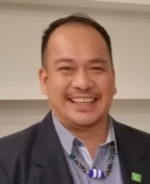 |
HON. ADRIAN BANIE LASIMBANG |
 |
JADE ANGANGALAO |
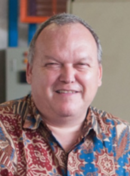 |
GERHARD FISCHER |
Moderator | |

|
MOLLY HURLEY-DEPRET |
Thematic Discussant
 |
LANZ GABRIEL JABLA |
Organizers
|
The Hydro Empowerment Network (HPNET) is a knowledge exchange and advocacy platform for micro/mini hydro practitioners in south and southeast Asia, focusing on policy, technology, and socio-environment solutions for long-term sustainability. Core support for HPNET comes from the WISIONS initiative at the Wuppertal Institute for Climate, Environment and Energy. | |
|
WISIONS of Sustainability initiative's main objective is to make clean energy a default solution for basic energy needs in developing regions, by helping local partners to identify successes and bring them to scale through regional networks, marketing and demonstration. | |
| Energypedia UG is a non-profit organization that runs and maintains the wiki-based platform, www.energypedia.info. Energypedia.info is an online platform for collaborative knowledge exchange on renewable energy, energy efficiency and energy access in the context of development cooperation. |

